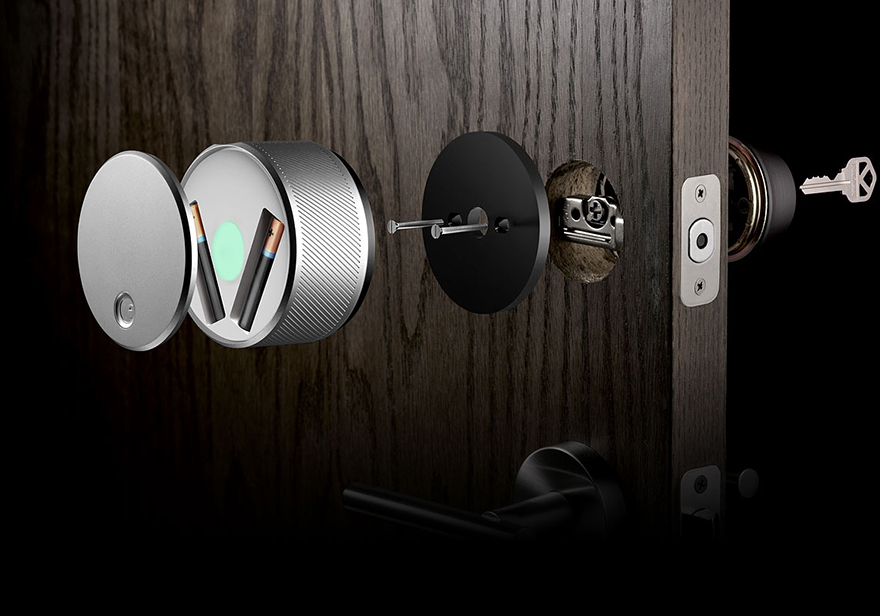We’re hearing a lot at the moment about the advantages and disadvantages of smart door locks, over key fob electronic door entry systems. Smart door locks supplement or replace your front door lock, but do much more than lock and unlock your door without a key. Most smart locks let you track who’s entering and leaving your home, send digital ‘keys’ to designated people, and remotely lock and unlock your door when you’re away from home.
Now, smart lock use is being driven largely by the Airbnb craze. Property managers demand a solution to the hassle of arranging for keys to be passed back and forth, and controlling exactly who has access to their properties and when. These are all reasons to invest in smart door lock technology.
Duplicated keys are a concern for property owners
For Airbnb and holiday rental hosts, giving keys to a renter and retrieving them at the end of their stay can present a logistical challenge and warrant undue hassle. There have long been solutions for these issues including outdoor mini key safes and keypad locks with a combination that can be changed on demand, but these are sometimes considered unsecure given the opportunity it affords guests to duplicate keys or share codes.
It’s a particular concern for landlords, who cannot always be sure how many copies of keys to have been duplicated for guests, contractors and to replace keys that have been lost. Even keys stamped ‘do not duplicate’ are duplicated all the time, but there are options available for high-security locks with keys that can’t be replicated at a hardware store.
London-based security company Banham have been leading providers of high security door locks since 1926. Their unique key registration system ensures that only the registered homeowner is authorised to obtain copies of keys. This helps property owners maintain peace of mind whenever keys are out of their hands. But this isn’t the only solution for preventing duplication of keys. An answer lies in smart door locks too.
Smart door locks don’t require keys
Smart door locks negate the need to share keys to your property at all, granting access to a property by electronic means, such as a smartphone app or biometric data recognition. It means guests don’t need to worry about losing keys and getting locked out either. This is a far better solution than keypad access, which is a security risk as holiday guests often write down (and then lose) codes they find difficult to remember.
Kwikset’s Kevo smart lock is a hardware that lets property managers grant and revoke access to guests with a smartphone app. Authorised users can simply point their phone at a door lock to gain access, and only that specific smartphone user will be able to gain entry. There’s another advantage to smart door locks that use smartphone integration, as they also work as a security doorbell that allow property owners and guests to view video of callers and grant access remotely.
Of course, most smart door locks can be overridden by a master key, which allows the property owner to maintain access to their property in the event of an emergency such as a power cut that might disable the electronic smart door lock system.
Smart door locks allow for time-limited authorization
Many smart locks are able to let landlords remotely grant and restrict entry to their rented premises on a use-by-use basis. This allows property managers and hosts to schedule access to a rental property for a limited time, which is perfect for the high turnover of guests in holiday rentals and Airbnbs.
Smarke is a smart door lock solution that uses biometric and facial recognition data, to grant entry to specific individuals at specific times. Specific ‘users’ can be programmed into the central control system, and property managers can designate specific dates and times during which that person will be granted access. It could cover a week or two for each holiday guest, or an hour window to grant access to a cleaner or service provider.
There are even now options for apartment owners, who often find installing a smart door lock on their property door is redundant because of a buzzer-controlled shared outer door. Iki Lock works like a remote doorman that can remotely trigger a building intercom to open the outer door.
It’s difficult to see how smart door lock technology can improve from here, given the complete control already afforded to property managers by the examples given above. Of course, the uses aren’t limited to holiday lets and Airbnb properties. Smart door locks let any property owner grant time-limited access to visitors, children, trusted service workers or guests as and when needed. It might just be time to throw away your keys for good.
Pic Credit – Scott Lewis, Flickr, Creative Commons



 Bitcoin
Bitcoin  Ethereum
Ethereum  Tether
Tether  XRP
XRP  Solana
Solana  USDC
USDC  TRON
TRON  Lido Staked Ether
Lido Staked Ether  Cardano
Cardano  Avalanche
Avalanche  Toncoin
Toncoin